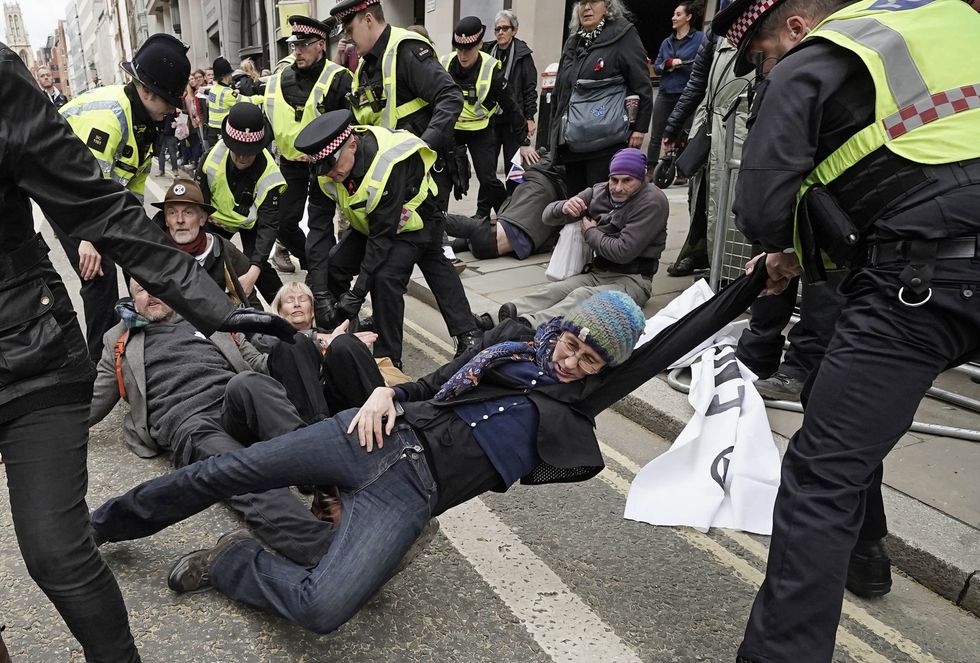Crackdown needed against 'reckless and selfish' eco-activists, says minister
'Insulate Britain, Extinction Rebellion and others have overstepped that line', says Baroness Williams
Don't Miss
Most Read
A protest crackdown is needed to protect the public from severe disruption caused by the “reckless and selfish tactics” of eco-activists, the Government has said.
Climate change demonstrators had “overstepped the line”, argued Home Office minister Baroness Williams of Trafford as she made the case for a series of changes to the Police, Crime, Sentencing and Courts Bill in response to action taken by Insulate Britain and others to shut down major transport networks.
These included tougher sentences for blocking motorways and roads and allowing police officers to stop and search anyone at a protest “without suspicion” for items used to prevent a person being moved, known as “locking-on”.
Individuals with a history of causing serious disruption also face being banned by the courts from attending certain protests.
However, peers on the opposition benches in the House of Lords have strongly criticised the controversial measures and the way they have been introduced at such a late stage of the passage of the Bill, which has already gone through the Commons.
The provisions come on top of other contentious curbs on demonstrations proposed in the legislation, including powers to impose conditions on protests judged to be too noisy.
Police remove Extinction Rebellion protestors during the Lord Mayor's Show parade in the City of London.
Aaron Chown
Speaking as day 11 of the Bill’s committee stage stretched into the early hours, Lady Williams said the behaviour of the activists had “clearly demonstrated that the balance between the rights of protesters and the rights of others tips far too far in favour of the protesters”.
She said: “We cannot have sections of our transport infrastructure or other critical infrastructure brought to a halt by a small group of protesters, whatever their cause.
“We accept some level of disruption is to be accepted and tolerated from protest action, but there is a line to be drawn.
“Insulate Britain, Extinction Rebellion and others have overstepped that line.”
She added : “This suite of new measures is necessary to protect the public from the unacceptable levels of disruption we have seen as a result of the reckless and selfish tactics employed by some protest organisations in recent weeks.
“We stand by the right to protest, but that does not afford a right to cause unlimited disruption to others irrespective of the cost to business, the dangers caused to road users and the police, the risk to life by blocking ambulances and the hardship caused to the public seeking to get to work or going about their daily lives.”
Opposing the measures, Liberal Democrat Lord Paddick, who was a deputy assistant commissioner in the Metropolitan Police, said: “Overall these are outrageous proposals with serious consequences in terms of police powers, infringement of civil liberties and the creation of new offences, introduced in a wholly unacceptable way at the last minute at the committee stage in the House of Lords. These amendments must be withdrawn and seriously reconsidered.”
Labour former shadow attorney general Baroness Chakrabarti, who was previously director of the human rights group Liberty, said: “This suite looks to me, smells to me, tastes to me a lot like anti-terror legislation of the kind that I have always opposed as being disproportionate and counterproductive.”
Green Party peer Baroness Jones of Moulsecoomb said: “This is nothing more than a naked attack against civil liberties and a crackdown on protest and we must oppose it for both what it is and how it’s been done.”
Labour frontbencher Lord Kennedy of Southwark said: “This is no way to do business. To introduce clauses of such magnitude, complexity and controversy during a Bill in the House of Lords, and the Bill already having left the elected House, is just wrong.”
While condemning the actions of Insulate Britain activists, he said: “Crucial to remember is that although we are responding to one particularly crass protest, the law being debated would not just apply to that one crass protest but all peaceful protests and that is the issue.”
Pressing the Government to “temper” the measures, he said: “I think at the moment they are totally unacceptable and would not be passed by the House.”
The minister said she was “disappointed” at the objections, but said peers “should be in no doubt” they would be brought back at report stage.












